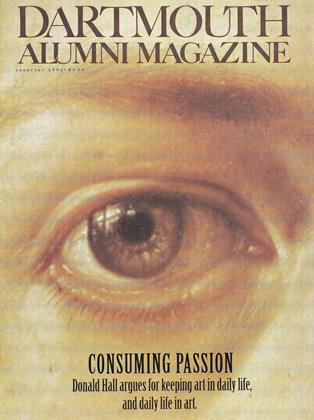Ken Weg, president of the Bristol Myers Squibb Pharmaceutical Group, received a human-relations award from the American Jewish Committee in New Jersey in November. Announcement of the fact gave me a good excuse to call him about health care reform, among other things.
Ken's career has rocketed him up through the executive ranks of the pharmaceutical business and all around North America and Europe. By my count, he's held 15 different posts since 1966. A Columbia M.8.A., he started out with Merck in New Jersey and Canada and moved to Bristol-Myers in 1969 as director of long-range international planning. He ran the company's pharmaceutical business in Scandinavia, Puerto Rico, Canada, then the Mideast, Africa, and Europe before switching to Squibb in 1987 and becoming president of the Squibb Pharmaceutical Group. The two companies merged in 1989, and last March Ken took on his present job as the top man in charge of 60 percent of the company's total $11.5 billion worth of sales.
I caught up with Ken as he was recovering at home from a back operation. He said, on the subject of the Hillary Clinton health-care plan, "you won't find anyone in my business who is against the idea of universal coverage, but solving the problem doesn't require the kind of government intrusion into one-seventh of the national economy that they're talking about. It's an overweening experiment in government control that no one knows about the outcome of... a giant reengineering scheme that's unworkable."
Hillary Clinton, of course, has been beating the dickens out of drug companies, accusing them of profiteering and price-gouging. Ken says that drugs actually represent seven percent of all U.S. medical costs, and that this will fall to five percent by the year 2000. He thinks that Mrs. Clinton is hacking drag companies as a means of mobilizing political support amongst over-65 Medicare patients, who get their medical care free but have to pay for drags and resent it.
The drug industry, he says, hasn't fought back well. "There have been pricing abuses," he acknowledges, but most Americans don't realize how drugs help save billions in hospital time and lost productivity. Interestingly, he says, when Mrs. Clinton's health task force invited him and other top drug executives down to Washington, they met not with Mrs. Clinton or top task force officials, but with what appeared to be "the class of '94" a group of young people "who didn't have a clue what was going on ... It was like Lord of theFlies."
Outside of work, Ken has raised money for the AJC, the Philadelphia Museum of Art, the Audubon Society, and the Nature Conservancy. His wife, Carol, is a fundraiser for the Eden Institute, which aides autistic children, and Princeton Hospital.
Other news: as Dudley Smith reported in our class newsletter, the class of '60 scholarship fund, chaired by Bob Kenerson, already contains $96,653 pledged and given. This fund is our lasting monument at Dartmouth, gang, and we've already assembled more than a third of the endowment of the largest such class fund, which Bob's father helped start for the class of'2B. So let's dig!
7405 Ridgewood Ave. Chevy Chase, MD 20815
 View Full Issue
View Full Issue
More From This Issue
-
 Feature
FeatureRAKES WHO CLIMB
February 1994 By Deab Engle '91 -
 Feature
FeatureTau Iota Tau and Other Brassy Memories
February 1994 By Regina Barreca '79 -
 Cover Story
Cover StoryA leading poet argues that, whether consciously or unconsciously, we all breathe art's air.
February 1994 By Donald Hall -
 Feature
FeatureONCE UPON A CRIME
February 1994 By Lawrence Treat '24 -
 Feature
FeatureWHALE DOG
February 1994 By Christopher Phillips -
 Article
ArticleDr. WHEELOCK'S JOURNAL
February 1994 By "E. Wheelock"
Morton Kondracke
Class Notes
-
 Class Notes
Class NotesBaltimore
April 1949 By ALLEN BARRETT '44 -
 Class Notes
Class Notes1981
MARCH • 1986 By Dirk D. Olin -
 Class Notes
Class Notes1948
December 1948 By FRANCIS R. DRURY JR., WILLIAM C. FELTON -
 Class Notes
Class Notes1926
MARCH 1989 By H. Donald Norstrand -
 Class Notes
Class Notes1943
November 1978 By HERBERT L. MARX JR. -
 Class Notes
Class Notes1960
Nov/Dec 2006 By Ken Reich







